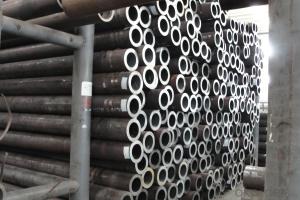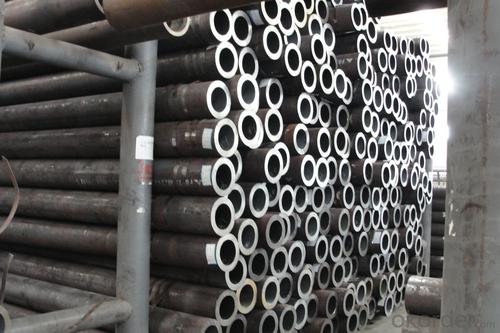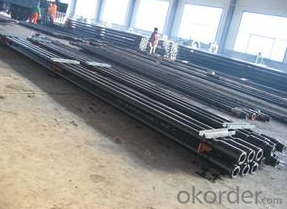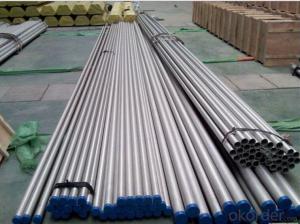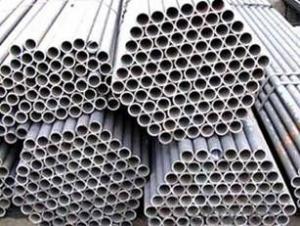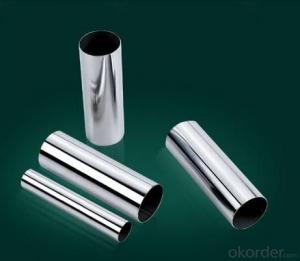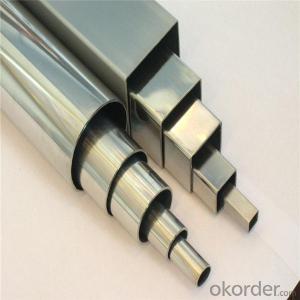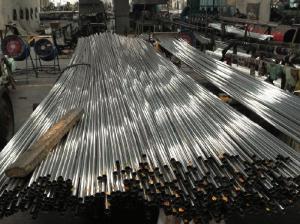60mm-102mm Drill Pipe & API Drill Rod
- Loading Port:
- China Main Port
- Payment Terms:
- TT or LC
- Min Order Qty:
- 25MT m.t.
- Supply Capability:
- 1000MT m.t./month
OKorder Service Pledge
OKorder Financial Service
You Might Also Like
1. Process of High Quality Drill Rod
1). The performance and advantages: rod tube ends inside and outside thicker type, the joint use of phosphate or plated steel threaded processing.
2). The product uses: down hole drilling operations, to extend the drill footage;
3). Service: home delivery, tracking services;
4). Packing: steel strapping, compartment plate press-fit.
2. Specification High Quality Drill Rod
Size | Normal | Calculated Plain-End weight | Grade | Outside Diam. | Wall Thickness | Upset type | Tool Joint | ||||
in | mm | Lb/ft | Lb/ft | kg/m | Inch | mm | Inch | mm | |||
2-3/8 | 60.3 | 6.65 | 6.26 | 9.32 | E,X,G,S | 2.375 | 60.3 | 0.28 | 7.11 | EU | NC26 |
2 7/8 | 73 | 10.4 | 9.72 | 14.48 | E,X,G,S | 2.875 | 73 | 0.362 | 9.19 | EU IU | NC31 |
3 1/2 | 88.9 | 9.5 | 8.81 | 13.12 | E | 3.5 | 88.9 | 0.254 | 6.45 | EU IU | NC38 |
3 1/2 | 88.9 | 13.3 | 12.31 | 18.34 | E,X,G,S | 3.5 | 88.9 | 0.368 | 9.35 | EU IU | NC38,NC40 |
3 1/2 | 88.9 | 15.5 | 14.63 | 21.79 | E | 3.5 | 88.9 | 0.449 | 11.4 | EU IU | NC38,NC40 |
3 1/2 | 88.9 | 15.5 | 14.63 | 21.79 | X,G,S | 0.449 | 11.4 | EU IEU | |||
4 | 101.6 | 14 | 12.93 | 19.26 | E,X,G,S | 4 | 101.6 | 0.33 | 8.38 | EU IU | NC40,NC46 |
4-1/2 | 114.3 | 13.75 | 12.24 | 18.23 | E | 4.5 | 114.3 | 0.271 | 6.88 | EU IU | NC46,NC50 |
4-1/2 | 114.3 | 16.6 | 14.98 | 22.31 | E,X,G,S | 4.5 | 114.3 | 0.337 | 8.56 | EU IEU | NC46,NC50 |
4-1/2 | 114.3 | 20 | 18.69 | 27.84 | E,X,G,S | 4.5 | 114.3 | 0.43 | 10.92 | EU IEU | NC46,NC50 |
5 | 127 | 16.25 | 14.87 | 22.15 | X,G,S | 5 | 127 | 0.296 | 7.52 | IU | NC50.5,1/2FH |
5 | 127 | 19.5 | 17.93 | 26.71 | E | 5 | 127 | 0.362 | 9.19 | IEU | NC50.5,1/2FH |
5 | 127 | 19.5 | 17.93 | 26.71 | X,G,S | 5 | 127 | 0.362 | 9.19 | EU IEU | NC50.5,1/2FH |
5 | 127 | 25.6 | 24.03 | 35.79 | E | 5 | 127 | 0.5 | 12.7 | IEU | NC50.5,1/2FH |
5 | 127 | 25.6 | 24.03 | 35.79 | X,G,S | 5 | 127 | 0.5 | 12.7 | EU IEU | NC50.5,1/2FH |
3.Strength High Quality Drill Rod
Grade | Yield Strength | Tensile strength | |||||
min | max | min | |||||
Psi | Mpa | Psi | Mpa | Psi | Mpa | ||
1 | E-75 | 75 | 517 | 105 | 724 | 100000 | 689 |
2 | X-95 | 95 | 655 | 125 | 862 | 105000 | 724 |
G-105 | 105 | 724 | 135 | 931 | 115000 | 793 | |
S-135 | 135 | 931 | 165 | 1138 | 145000 | 1000 | |
4.FAQ of High Quality Drill Rod:
①How is the quality of your products?
Our products are manufactured strictly according to national and internaional standard. Guaranteed: If products’ quality don’t accord to discription as we give or the promise before you place order, we promise 100% refund.
②How about price?
Yes, we are factory and be able to give you lowest price below market one, and we have a policy that “ for saving time and absolutely honest business attitude, we quote as lowest as possible for any customer, and discount can be given according to quantity.
③Why should you chose us?
We believe that good quality+good price+good service=customer’s trust
SGS test is available, customer inspection before shipping is welcome, third party inspection is no problem.
6、High Quality Drill Rod Images:
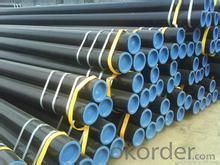
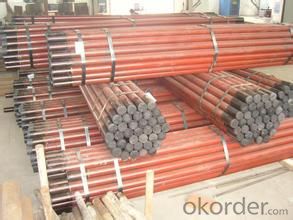
- Q: How are steel pipes used in airport infrastructure?
- Steel pipes are used in airport infrastructure for a variety of applications such as constructing hangars, fuel distribution systems, water supply networks, and underground utility lines. They provide structural support, durability, and resistance to extreme weather conditions, making them essential for the smooth functioning and long-term reliability of airport facilities.
- Q: What are the advantages of using steel pipes over other materials?
- There are several advantages of using steel pipes over other materials. Firstly, steel pipes are incredibly durable and have a high tensile strength, making them resistant to extreme temperatures, pressure, and corrosion. Secondly, steel pipes have excellent structural integrity, allowing for longer spans and fewer supports. Additionally, steel pipes are highly versatile and can be easily welded, threaded, or joined, making installation and maintenance easier. Lastly, steel pipes are cost-effective in the long run as they require minimal maintenance and have a longer lifespan compared to other materials.
- Q: What are the advantages of using pre-fabricated steel pipes?
- There are several advantages of using pre-fabricated steel pipes in various applications. Firstly, pre-fabricated steel pipes offer a high level of durability and strength. Steel is known for its robustness and resistance to external forces, making it an ideal material for constructing pipes that need to withstand high pressure or heavy loads. This durability ensures that pre-fabricated steel pipes have a longer lifespan compared to other materials, reducing the need for frequent replacements and maintenance. Secondly, pre-fabricated steel pipes provide excellent corrosion resistance. Steel pipes are often coated with protective layers, such as galvanization or epoxy, which prevent rusting and corrosion. This corrosion resistance is particularly crucial when the pipes are used in industries or environments where they may come into contact with moisture, chemicals, or other corrosive substances. By utilizing pre-fabricated steel pipes, the risk of leaks, deterioration, or failure due to corrosion is significantly reduced. Another advantage of pre-fabricated steel pipes is their versatility and ease of installation. These pipes are manufactured to precise specifications before being delivered to the site, allowing for quick and efficient installation. Their modular nature means that they can be easily assembled, disassembled, and reconfigured as needed, making them suitable for a wide range of applications, from industrial settings to residential construction. Moreover, pre-fabricated steel pipes can be easily integrated with other building components, such as fittings, valves, and connectors, ensuring a seamless connection and reducing installation time and costs. Furthermore, pre-fabricated steel pipes are more environmentally friendly compared to other materials. Steel is a highly recyclable material, and using pre-fabricated pipes reduces the consumption of natural resources and energy required for their production. Additionally, the long lifespan of steel pipes reduces waste generation and the need for frequent replacements, further contributing to sustainability efforts. Lastly, pre-fabricated steel pipes offer cost advantages. While the initial cost of steel pipes may be higher than some other materials, their durability and low maintenance requirements result in long-term cost savings. The reduced need for repairs, replacements, and maintenance, as well as the ease of installation, translates into lower overall project costs and reduced downtime. In summary, the advantages of using pre-fabricated steel pipes include durability, corrosion resistance, versatility, ease of installation, environmental friendliness, and cost-effectiveness. These benefits make pre-fabricated steel pipes a preferred choice for various industries and applications.
- Q: How are steel pipes graded?
- The quality and suitability of steel pipes are determined by grading them based on several factors. The grading system typically takes into account parameters such as the chemical composition, mechanical properties, manufacturing method, and testing standards. 1. When it comes to the chemical composition, steel pipes are graded according to the elements present in their composition. This includes the quantities of carbon, manganese, phosphorus, sulfur, and other alloying elements. The pipe's strength, corrosion resistance, and other properties are greatly influenced by its chemical composition. 2. The mechanical properties of steel pipes play a crucial role in determining their strength, flexibility, and resistance to pressure and temperature. These properties encompass tensile strength, yield strength, elongation, hardness, and impact toughness. Pipes with higher mechanical properties are generally given higher grades. 3. The manufacturing method used for steel pipes can vary, with options such as seamless, welded, or ERW (Electric Resistance Welding). The manufacturing method has an impact on the pipe's integrity, dimensional accuracy, and overall quality. For example, seamless pipes are considered to be of higher quality due to their uniformity and lack of weld seams. 4. Steel pipes are graded based on their adherence to specific testing standards. These standards ensure that the pipes meet the required quality criteria and are suitable for their intended applications. Common testing standards include ASTM (American Society for Testing and Materials), API (American Petroleum Institute), and EN (European Norms). Taking these factors into consideration, steel pipes are often assigned alphanumeric codes or specifications for grading. For instance, pipes used in the oil and gas industry may be graded as API 5L (American Petroleum Institute), while pipes used for structural purposes may be graded as ASTM A500 (American Society for Testing and Materials). In conclusion, the grading of steel pipes is determined by their chemical composition, mechanical properties, manufacturing method, and adherence to testing standards. These grades assist customers and manufacturers in selecting the appropriate pipes for specific applications, ensuring safety, durability, and efficiency across various industries.
- Q: What are the different types of steel pipe supports for thermal expansion?
- There are several types of steel pipe supports for thermal expansion, including rigid supports, flexible supports, and guided supports. Rigid supports are typically used for straight pipe runs and provide a fixed point of support. Flexible supports, such as spring hangers or variable spring supports, allow for vertical movement of the pipe due to thermal expansion. Guided supports, on the other hand, restrict movement in all directions except axial movement, helping to maintain the alignment of the pipe during thermal expansion.
- Q: How are steel pipes tested for quality control?
- Steel pipes are tested for quality control through various methods such as visual inspection, non-destructive testing, and physical testing. Visual inspection involves checking the pipes for any visible defects or inconsistencies in their appearance. Non-destructive testing methods like ultrasonic testing, magnetic particle testing, and radiographic testing are used to detect internal flaws or defects without damaging the pipes. Additionally, physical tests like tensile and impact testing are performed to evaluate the mechanical properties of the pipes. These comprehensive testing techniques ensure that steel pipes meet the required quality standards before they are used in various applications.
- Q: Could you tell me what difference between SC galvanized steel pipe and MT wire pipe?
- Hot galvanized steel pipe galvanized color silver plated SC.MT wire pipe galvanized color silver plated or silver plated cold yellow fever.
- Q: What does "DN25 PN16" mean?
- The welded steel pipe can be divided into thin-wall steel tube, ordinary steel pipe and thickened steel tube according to the thickness. Its nominal diameter is neither external diameter nor internal diameter, but a nominal size similar to the diameter of the ordinary steel pipe. Each nominal diameter corresponds to an outer diameter, and the inner diameter varies with the thickness. Nominal diameter can be expressed in metric mm, also available in English in. With nominal diameter pipeline accessories, meaning with tube. "DN25" means the inner diameter of the steel pipe is 25MM.
- Q: What are the advantages of using steel pipes in the manufacturing industry?
- Steel pipes offer several advantages in the manufacturing industry. Firstly, steel pipes are highly durable and have a long lifespan, making them ideal for handling heavy loads and withstanding harsh conditions. Secondly, steel pipes are resistant to corrosion, rust, and chemical reactions, ensuring that the material being transported or processed remains uncontaminated. Additionally, steel pipes have high tensile strength and can withstand high pressure, making them suitable for various applications like transporting liquids, gases, and solids. Furthermore, steel pipes are versatile and can be easily customized to meet specific manufacturing requirements. Lastly, steel pipes are cost-effective due to their longevity, low maintenance needs, and recyclability, making them an economical choice for the manufacturing industry.
- Q: Can steel pipes be used for oil transportation?
- Yes, steel pipes can be used for oil transportation. Steel pipes are commonly used in the oil and gas industry for the transportation of crude oil, petroleum products, and natural gas. They are preferred due to their strength, durability, and resistance to corrosion. Steel pipes are capable of withstanding high-pressure environments and can be used for both onshore and offshore oil transportation. Additionally, steel pipes can be welded together to form long pipelines, making them a cost-effective solution for transporting oil over long distances. Overall, steel pipes are a reliable and efficient choice for oil transportation.
Send your message to us
60mm-102mm Drill Pipe & API Drill Rod
- Loading Port:
- China Main Port
- Payment Terms:
- TT or LC
- Min Order Qty:
- 25MT m.t.
- Supply Capability:
- 1000MT m.t./month
OKorder Service Pledge
OKorder Financial Service
Similar products
Hot products
Hot Searches
Related keywords
